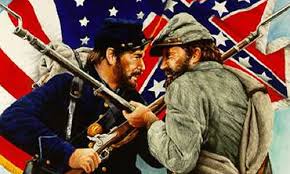Madi Smith
Film Essay
Learning
history through text book readings only can prove to be a boring way to learn for
most people. By diversifying the way that a student learns, a teacher can help
improve the amount of information a student, like myself, can retain after each
lesson. By using movies as an addition to textual reading and research, I’ve
been able to paint a clearer picture of the topic we are currently studying—The
Civil War.
During
first quarter we watched Glory, best
described by the director as “a chance to re-examine history.” In this way,
Edward Zwick is bringing life to what I would have read in the history text
books. By bringing these text books to life with actors, it allows me to see a
more realistic version of what went on during the Civil War, thus making it
easier for me to strengthen my knowledge and gain new insights and perspectives
on the War Between the States. Glory
is a perfect example of bring history to life, even Edward Zwick believe that
54th regiment was an cardinal point in the Civil War, because without
the 54th regiment and others like it the Union might not have won
the Civil War. One of my favorite quotes is the tag line to Glory—“Their innocence. Their heritage.
Their lives. Nothing would be spared in the fight for their freedom.” It is a
clear depiction of what the African American soldiers were fighting for. Though
it was only used to be a pick-up line for the movie, it can actually be used to
describe what the 54th regiment was fighting for during the real civil
war. This all really goes back to how movies can actually be used as a source
of information! Initially I was thought that watching movie for learning really
wouldn’t do much, but in reality I’ve solidified my knowledge about the Civil
more than I ever did reading boring text books. Mainly because there are
perceptible emotions which also make it easier to empathize and understand
history on a deeper level.
Emotionally
taxing movies by consequence make us think on a deeper level, because we want
to understand why it made us feel that way. While learning history it is
important to empathize with both sides of the argument, like understanding the
position of the Confederates versus the Union soldiers. Deeper than that you
could learn to understand the difference of opinion between white Union
soldiers and African American Union soldiers or how the whites felt about free
blacks and vice versa. The movie 12 Years
a Slave, is a recent depiction of the time period post Civil War and is
based on a true story and memoir of a free man brought back to slavery and
freed once again. The creator of the sound track to 12 Years a Slave said that he wanted to “work on something that…felt
[like]…unresolved history.” The word unresolved leads to me to believe that
besides missing a part of history you are missing the emotions and the
understanding of what a freed man like Solomon was going through. Meaning most
people would have only understood the views and opinions of the white men
during that time period. Steve McQueen even believed that by telling this story
he could reveal a new truth about what actually went on post Civil War. He even
left the interpretation to the audience, saying “Just tell them truth on
screen, whatever that is.” This lets history students like myself use our
analytical skills to decipher the truth in the movies and form a more developed
sense of that time period. This can be difficult for most because movies are
laced with small changes to help create a more “payer friendly” movie.
Both
movies were critically acclaimed movies because of their sensational and heart
wrenching plots. None of these movies can be claimed as 100% accurate, but
during my research I found that changes made to the movies were in order to
create a more well rounded perspective and movie. Glory is a perfect example of this.
Edward Zwick, the director, is sometimes ridiculed for having made up
the supporting characters in the 54th regiment, but in reality there
were very few personal accounts of African American soldiers leaving him with
nothing to make up the regiment. His ability to create the supporting actors
and have them blend into the story like they actually existed proved that he
understood what a group like the 54th regiment would have been like.
Each character has a different personality to help create diversity in the
movie but this also helps a critical thinking student, like myself find
different ways to empathize and understand the emotions of that time period.
The relationship between Colonel Shaw and his soldiers versus Major Forbes and
the regiment paints two different points of view of how black soldiers were
treated by their higher-ups and how they empathized with each other.
These
two movies are two out of many movies that are clear depictions and great
representations of the Civil War. Using these movies as educational materials
along with text books and research has helped me retain more knowledge of the
Civil War. They have even opened my eyes to new perspectives between different
groups in that time period, making it easier for me understand what was
actually going on during those tense times.
Hyper Links
Wikipedia
History vs. Hollywood
IMDb
Reel Views
History Net
The Tech: Online Edition
Movie Fone

No comments:
Post a Comment